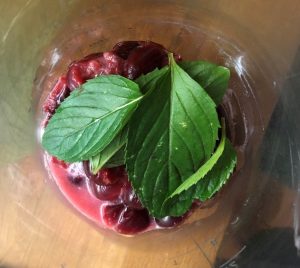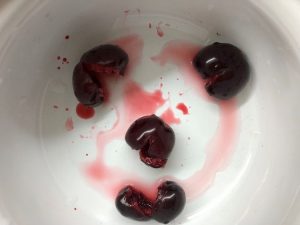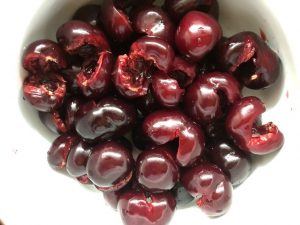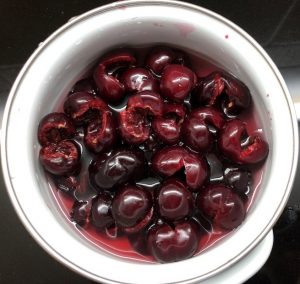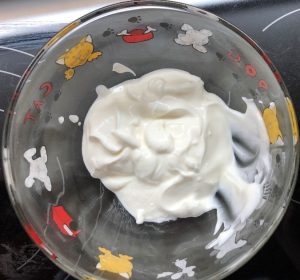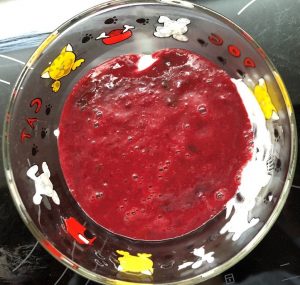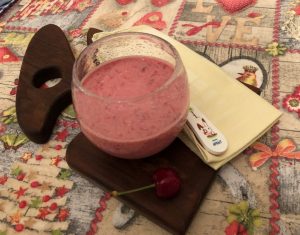Hip-hip-hooray for cherries!
They have arrived earlier this year! Welcome! Is there anything better than the taste of fresh, sweet, juicy cherries? Cherries are available for a very short time, but once here, as they are now, grab them by both hands and introduce them into the diet of your baby. If you decide to meet your baby with cherries before they are 8 months old, then cook them and blend them, so as to make a fine pure and that the baby can properly digest the tough skin of the cherry. It would not hurt to ask your paediatrician if you can use cherries even while the baby is only starting to use fruits, because if you miss them now, you will have to wait for these fresh, unusual, seasonal beauties till the next year. Cherries are armed with antioxidants and are perfect for the babies and all our children in the warm days ahead of us.
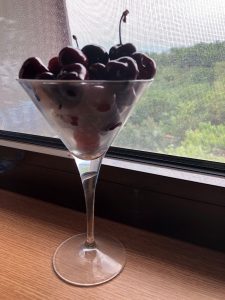
Cherries’ ID
Cherries, like blueberries and other strongly coloured fruits, have a dark-red complexion which originates from the high concentration of anthocyanin and antioxidants. Whether sour or sweet, cherries bring you a vast quantity of antioxidants, so don’t wait for a long time while it is their season, but eat them as much as you can!
Vitamins
Vitamin A – important for the baby’s sight and health of eyes, growth of bones. Also, it is an immense support to the immune system in the daily fight against villains.
Vitamin C – we are all aware of the importance of vitamin C, but we should point out that it also helps to resolve problems with bones and skin, hence that it helps to keep the baby’s gums and teeth healthy.
Vitamin K – important for the coagulation of blood.
Thiamine – Vitamin B1 has an important role in transferring glucoses into energy.
Minerals
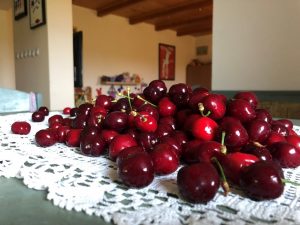
Potassium – electrolyte mineral that cooperates with sodium in the form of a famous sodium-potassium pump for the control of water and healthy blood pressure.
Iron – important for the good values of haemoglobin, which is the key ingredient of healthy red blood cells (erythrocytes). Haemoglobin is the “blood pigment” which gives the red colour to erythrocytes – red blood cells. It is of EXCEPTIONAL importance since it performs one of the most important things in the organism – transfers oxygen from lungs to all the body parts, and brings carbon dioxide (from tissue) to lungs.
Manganese – responsible for the better bone structure, and the absorption of calcium, development of connective tissue, proper performance of thyroid, regulation of blood sugar levels, as well as the metabolism of fats and carbon hydrates depends on it.
Copper – protects cell membranes.
Phosphor – highly important for the formation of bones and teeth.
Magnesium – this important mineral serves to help the bones to be strong and the heart beat equal.
Calcium – important for the formation of healthy bones and teeth of our fast-growing babies.
Dear mums, if you are eating cherries, do not be afraid of its sugars. Some studies have shown that cherries can help in the faster combustion of fat and the decrease of belly-fat.
It is good to know that the high content of fibres in cherries may have a mild laxative effect on body. Cherry pure may be a good way to fight obstipation of a baby or of your toddler.
How to choose and store cherries for your baby
Cherries are sensitive and must be treated with due care. Similarly as we should be, mums. Cherries must be immediately stored in the fridge, and once you take them, seek for those that are harder. If you buy them in the green market, make sure to try them. In that way, you will see if they are fresh or not. Also, if you are not in a position to pick them directly from a tree, seek them in the green market. Their season is just starting and booths are full of them. Organic ones are always welcomed, but given that a lot of mums cannot buy organic food nowadays, always whisper to the seller that you are buying them for a baby. Maybe one of them will respond to that.
Considering that they are available for a very short period during the year, it is good to know that they respond well to the freezing. Wash them and freeze them in packages that have a bit of air and enjoy their charms throughout the year.
When you prepare them for a baby afterwards, you can take a few of them, so that the baby can eat them with its little fingers, or cook them and get a sweet pure. Also, if it`s summer-period, you will have a delightful sorbet. Add frozen cherries into an extra fast blender and you will have the creamy texture which is tasty as an ice-cream in no-time.
And now, the recipes:
CHERRIES + MINT + GREEK YOGHURT (OR A REGULAR THING YOGHURT OR ORGANIC SOUR MILK)
1 CUP OF CHERRIES
2-3 LEAVES OF MINT
1-2 CUPS OF GREEK YOGHURT OR REGULAR THICK YOGHURT OR ORGANIC SOUR MILK
Put cherries, which you have cleaned from the core, into a pot. Pour just enough water to cover them. Cook for 10 minutes. Drain them. Leave them to cool for a bit. Put them in a blender with the mint leaves. Mix. Once the cream is formed, add yoghurt. Mix. Do not blend now. You will have around 4 portions for the baby. It will last in the fridge for 3 days, but the sooner you eat it the better.
Bon appetite! YUMMY…
